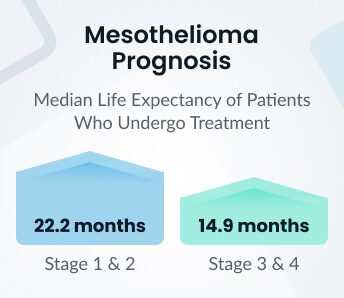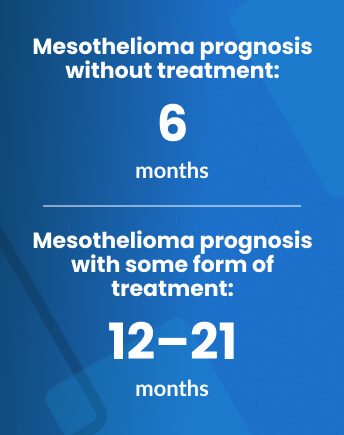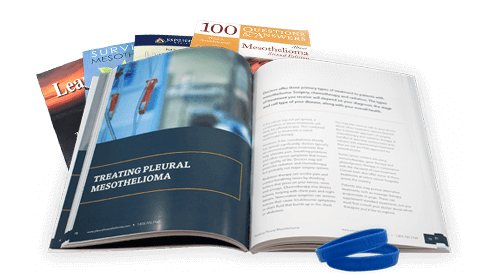Mesothelioma Prognosis
A mesothelioma prognosis is how a doctor describes a patient’s overall outlook. Patients with early-stage mesothelioma have a life expectancy of 22 months, while late-stage patients live an average of 14 months. About 52% of peritoneal mesothelioma patients who are eligible for surgery with heated chemotherapy live at least five years.
What Is the Prognosis for Mesothelioma?
The prognosis for people with mesothelioma is generally poor unless they’ve been diagnosed with a treatable form of the cancer. Mesothelioma is a terminal cancer with no known cure, but some people who are diagnosed early and undergo aggressive treatment outlive the average life expectancy of one year.
Prognosis refers to the prospect of recovering from a disease. Doctors largely base their prognosis off of survival rate data, which captures the percentage of people who are alive with a disease one, two and five years after diagnosis.
They also discuss prognosis in terms of life expectancy, or how much the disease might shorten a person’s life span. Life expectancy is usually presented as the number of months or years a person may live with mesothelioma.
The terms prognosis, survival rate and life expectancy are often used interchangeably even though they refer to different aspects of how a disease affects a person’s life. When a patient asks about their prognosis, doctors are aware that what they really want to know is how long they have to live. The average for all types and stages of mesothelioma is about one year.
Mesothelioma Prognosis by Type
The four types of mesothelioma are associated with different prognoses. Treatment is available to improve the prognoses of all four types of mesothelioma.
-

Pleural Mesothelioma Prognosis
The prognosis for pleural mesothelioma is favorable for patients diagnosed in an early stage and unfavorable for those diagnosed at a late stage. The average life expectancy is about one year, but patients who are diagnosed early and elect treatment may live for several years. Surgery is the most effective treatment option to extend survival, and up to 20% of patients qualify. Chemotherapy, radiation therapy and Tumor Treating Fields are available to all patients. Clinical trials are testing new therapies, including immunotherapy and photodynamic therapy. -

Peritoneal Mesothelioma Prognosis
The prognosis for peritoneal mesothelioma is unfavorable for patients diagnosed in a late stage. But it is significantly better among patients who qualify for surgery with heated chemotherapy. Approximately 52% of patients who undergo this aggressive procedure live longer than five years. Chemotherapy is available to patients who do not qualify for aggressive treatment. Without treatment, average life expectancy is about six months. Chemotherapy helps patients live at least a year and palliative care is available to improve symptoms and quality of life. -

Prognosis for Pericardial and Testicular Mesothelioma
The prognosis for these two extremely rare types of mesothelioma is generally poor for patients who do not qualify for surgery. Without surgery, the prognosis for pericardial mesothelioma is unfavorable and patients live around six months. Some patients who underwent surgery have lived for several years. The prognosis for testicular mesothelioma patients who undergo surgery is good. At least half live longer than five years and a third live at least 10 years. Chemotherapy and radiation therapy have been successful in the treatment of these types of mesothelioma.
Mesothelioma Prognosis by Stage

Staging is the most important prognostic factor considered by doctors when providing a patient’s prognosis. Mesothelioma has four stages of progression. A higher stage number indicates the cancer has grown and spread. This means the cancer is progressing and it is correlated with a worse prognosis.
An official staging system exists only for pleural mesothelioma. An unofficial staging system is in the works for peritoneal mesothelioma, and the other two types of mesothelioma have no staging systems. For this reason, prognosis data is not available for every type of mesothelioma at every stage.
Early-Stage Prognosis
The most favorable prognoses are associated with stage 1 and stage 2 mesothelioma. Tumors are generally small and haven’t spread far from where they formed, which makes them easier to operate on. Smaller tumors also respond better to chemotherapy and radiation therapy.
Better response to treatment is a major factor that explains why early-stage patients have a better prognosis. Catching the cancer early and treating it aggressively with a combination of surgery, chemotherapy and radiation therapy offers the best chance at long-term survival.
The five-year survival rate is 20% for early-stage pleural mesothelioma patients and 52% for early-stage peritoneal mesothelioma patients.
Late-Stage Prognosis
A less favorable prognosis is associated with stage 3 and stage 4 mesothelioma. Tumors spread throughout the chest cavity in these stages, which makes them harder to operate on and less responsive to chemotherapy and radiation therapy.
While some stage 3 patients qualify for surgery, most late-stage patients do not qualify. Chemotherapy, radiation therapy and Tumor Treating Fields therapy help patients live longer, but they rarely offer a chance at long-term survival. Some late-stage patients have lived for many years with mesothelioma because they joined a clinical trial and tried a therapy that worked well for them.
The five-year survival rate for late-stage pleural mesothelioma patients is 8%. Average life expectancy among late-stage peritoneal mesothelioma patients is 26 months.

Factors Affecting the Prognosis of Mesothelioma
Other factors that affect a mesothelioma prognosis include the tumor’s cell type, patient age, gender, race and overall health. Favorable factors, such as early stage, are associated with a good prognosis. Unfavorable factors, such as sarcomatoid cell type, are associated with a poor prognosis.
| Favorable | Unfavorable |
|---|---|
| Stage 1 and Stage 2 | Stage 3 and Stage 4 |
| Pericardial mesothelioma | Pleural mesothelioma |
| Testicular mesothelioma | Pericardial mesothelioma |
| Epithelial cell type | Sarcomatoid cell type |
| Less than 45 years old | 75 years old or older |
| Female | Male |
| Black race | White race |
| Good overall health | Poor overall health |
| No comorbidities | Comorbidities |
| Elect treatment | No treatment |
-
Cell Type
The three primary types of cells that make up mesothelioma tumors impact a patient’s prognosis significantly. Epithelial cells are the most common, the easiest to treat and are associated with the best prognosis. Sarcomatoid mesothelioma cells are the least common, the hardest to treat and are associated with a poor prognosis. Biphasic mesothelioma cells are a mix of the two and the prognosis depends on the ratio of cells. Patients with epithelial mesothelioma live an average of 200 days longer than patients with other cell types. -
Patient Age
Younger people have a better prognosis with mesothelioma than older people. Research shows that younger people respond better to aggressive treatment, which may be attributed to better overall health and stronger immunity. People under 45 have a better chance of living longer with mesothelioma than those over 75. The five-year survival rate for patients under 45 is 42.2%, while only 4.6% of patients over 75 live that long. -
Gender
Women have a significantly better prognosis with mesothelioma than men. Doctors suspect hormones underlie the difference in prognosis. Research hasn’t uncovered the exact relationship hormones may play, but doctors hope to harness it in the future to improve treatment results. Between 2010 and 2016, mesothelioma statistics from the Surveillance, Epidemiology and End Results program showed 16.3% of women lived for five years with mesothelioma, while only 7.3% of men survived that long. -
Race
Race has an impact on a mesothelioma prognosis. Data shows that black individuals have a better prognosis with mesothelioma than white individuals. According to data collected from the Surveillance, Epidemiology and End Results program in 2016, the five-year mesothelioma survival rate was 11.6% for white individuals and 17.3% for black individuals. -
Overall Health
A patient’s overall health plays a role in their individual prognosis. Factors that influence overall health include age, weight, smoking status, physical fitness, presence of chronic disease and other comorbidities. According to a 2017 study published in the Asian Pacific Journal of Cancer Prevention, pleural mesothelioma survival in patients with good overall health was 17 months. Patients with poor overall health lived 16 months, just one month less.
How to Improve a Mesothelioma Prognosis
While you can’t control your age, gender, cell type or cancer stage, there are steps you can take to improve your prognosis. Taking action to optimize your health, lifestyle and health care team may help you beat the odds and live longer with mesothelioma.
Get a Second Opinion from a Mesothelioma Specialist
Working with a mesothelioma expert at a specialized treatment center is the best step you can take to improve your prognosis.
Mesothelioma is rare compared to other cancers. Few doctors have the necessary tools or experience to treat and diagnose mesothelioma effectively.
Mesothelioma specialists understand the intricacies involved in ensuring you have the best possible care. Undergoing the treatments they recommend could help you live longer.
Treatment Options
People with early-stage tumors and the epithelial cell type can benefit from a combination of surgery, chemotherapy and other treatments such as radiation, immunotherapy and Tumor Treating Fields. This is called a multimodal approach. It is considered the gold standard for mesothelioma treatment, but only 15% to 20% of patients qualify for this aggressive treatment approach.

Patients who do not qualify for surgery may consider other multimodal plans that combine chemotherapy with Tumor Treating Fields, radiation therapy or immunotherapy.
Patients with late-stage mesothelioma usually benefit the most from palliative treatments. These focus on improving quality of life and controlling mesothelioma symptoms. Though palliative treatments aim to reduce pain and discomfort, they can also extend survival.
The prognosis without treatment is considered poor. Without treatment, pleural patients live an average of eight months and peritoneal patients live around six months.

Clinical Trials
Clinical trials test new and emerging treatment options. The National Institutes of Health maintains a list of clinical trials for pleural and peritoneal mesothelioma in various phases and in multiple trial sites across the U.S.
Clinical trials are testing new therapies such as immunotherapy drugs, gene therapy techniques and different combinations of treatment. Some long-term survivors credit their survival to joining a mesothelioma clinical trial.
Take Care of Your Health and Reduce Stress
The healthier you are, the better your body can fight cancer. Having good overall health and physical fitness will also help you endure the side effects of treatments. Reducing stress may also improve your health and boost your immune system.
- To boost your immune system, eat a balanced, nutritious diet rich in vegetables and fruit and low in sugar and fat.
- Drink plenty of water to stay hydrated.
- Talk to an oncology nutritionist who can recommend specific dietary changes that will strengthen your body.
- Find simple ways to get regular, light exercise. Do things you enjoy to keep your mind engaged.
- Get quality sleep — and plenty of it — to help your body recover from treatment.
- If you’re a smoker, you can improve your lung function and overall health by quitting immediately.
- Talk to friends, loved ones or a therapist about how you feel. Emotional health is important to your overall health.
- Leading a low-stress lifestyle can improve how your body responds to cancer treatment. Take a look at the stressors in your life and see what you can do to manage them and reduce the frustration and anxiety you experience.
Mesothelioma Remission and Recurrence
Remission is when a tumor shrinks or disappears from the body. Surgery, chemotherapy, Tumor Treating Fields, radiation therapy and immunotherapy can send mesothelioma into partial or complete remission.
Partial remission is when tumor size is reduced by at least 50%. Some mesothelioma patients have lived for years in partial remission. Complete remission is rare with mesothelioma.
Unfortunately, sooner or later, mesothelioma usually comes back. This is called cancer recurrence. Certain clinical trials specifically look for patients with a mesothelioma recurrence to test innovative new therapies.
Outlook for Mesothelioma Patients
Currently, no mesothelioma prognosis includes the possibility of a cure.
As with any type of cancer, the best doctors can hope for is long-term remission. Mesothelioma is a difficult cancer to treat, especially because it is usually caught in a late stage.
You can take inspiration from the stories of mesothelioma survivors who defied the generally poor prognosis for this disease.
-
Emily Ward has gone into remission twice with pleural mesothelioma thanks to tumor-removing surgery and a heavy chemotherapy regimen. These treatments have helped her remain active in her community years after her diagnosis.
-
Randy Boudreaux was not eligible for surgery when he was diagnosed, and he did not respond well to chemotherapy. But then his wife found a specialist who prescribed him a new immunotherapy treatment, which restored much of his quality of life.
-
Kay Kilpatrick-Simmons was determined to see her first granddaughter graduate high school, but it meant living with mesothelioma for six years after diagnosis. With a positive attitude, plus surgery, chemotherapy, radiation and cryoablation, she achieved her goal.
-
Rich DeLisle sought out a mesothelioma expert for his treatment because he did not just want to live longer — he wanted to have the energy to travel the world. His insistence gave him the opportunity to make treasured memories with his family over the following years.







